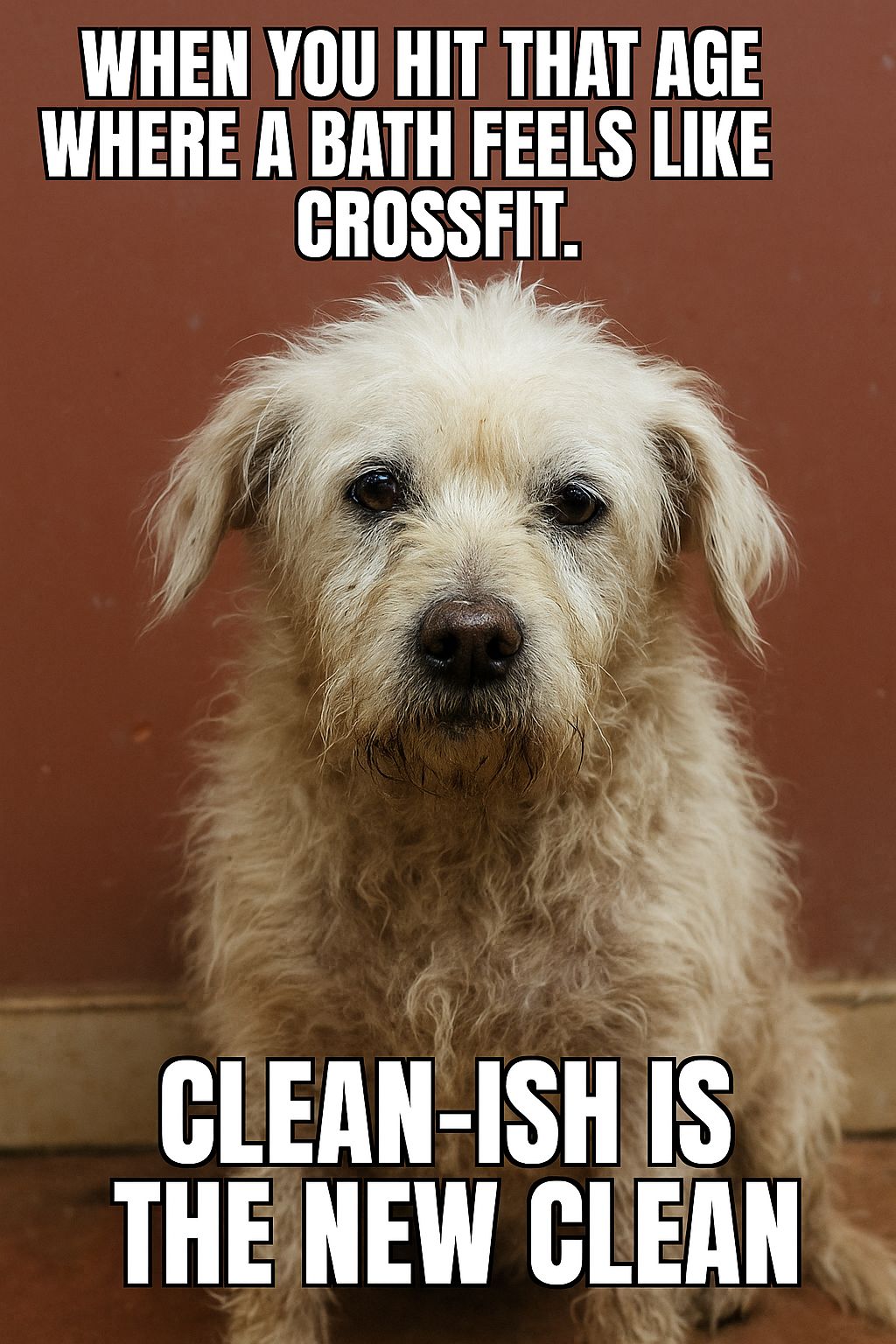- Grey Whiskers Senior Dog Digest
- Posts
- Clean Enough
Clean Enough
Rethinking Baths for Very Old Dogs


In this week’s issue, here’s what we are sniffing out
Old Dogs and Baths, the Conundrum
In a younger dog’s life, regular bathing (and the grooming that comes with it!) is one of the biggest keys to good health. Groomers are often the first to notice skin or ear issues or discover new lumps that need veterinary attention.
But what happens when your dog has reached the stage where even simple grooming feels overwhelming? When the process causes anxiety, exhaustion, or actual medical setbacks, is a bath still worth it?

Radar
When Less Bathing Is More
If your dog’s grooming visits or home baths lead to any of the following, it’s time to scale back or stop entirely:
At the groomer:
They can’t be finished because of agitation or anxiety
They faint, seize, or seem confused during the groom
They’re so sore afterward they can’t walk normally for days
They experience a flare-up of a medical condition
They’re “fired” by the groomer for safety reasons
At home:
They can’t stand for the bath, or it takes two people to manage safely
They resist so much you fear they’ll get hurt
They experience any of the above reactions
In these cases, cleanliness takes a back seat to comfort.
If you do choose to bathe occasionally, allow your dog to air dry, and monitor them afterward to ensure they stay warm. Older dogs often struggle to regulate temperature, so sweaters, blankets, or gentle heating pads can help.
When Bathing Still Matters
For some dogs, skipping baths entirely can lead to more discomfort down the road. Continue regular bathing if your dog:
Has a history of skin conditions, itching, or allergies
Develops odor or visible dirt buildup
Shows redness or irritation after a few weeks without cleaning

If your dog won’t tolerate a full bath but still needs one - maybe they’re stinky, irritated, or visibly dirty - try a sponge bath.
Wet a washcloth or sponge with warm water, add a drop of shampoo or a pump of non-rinse dog shampoo, and gently wipe the coat. Make sure the cloth or sponge isn’t sudsy; if you see bubbles, you’ll need to rinse. You can part the coat to reach the skin, but avoid scrubbing on long-coated dogs to prevent tangles.
If you’re no longer visiting the groomer regularly, you’ll need to become your dog’s skin and coat monitor. Set a reminder for every month, and do a quick head-to-tail check. After a few rounds, you’ll learn what “normal” looks like - and be better able to catch changes early.
What to Look For: A Monthly Wellness Check
Skin & Coat
Work methodically from nose to tail, parting the coat with your fingers or a comb. Don’t skip between the toes or under the paws.
Redness, rashes, sores, scaly or bald areas
Fleas, ticks, burrs, foxtails, or sticky residue
Mats or tangles (especially in long-coated breeds)
New lumps, or existing ones that change in size, shape, or color
Ears
Redness, foul odor, or discharge
Hair mats in or around the ear canal
Tangles behind the ears (a common trouble spot!)
Eyes
Redness or visible scratches
Discolored discharge or crusts in the corners
Bulging, watering, drooping lids, or the third eyelid showing
Nose
Cracking or thick dryness
Redness, swelling, or unusual texture (cauliflower-like)
Discharge of any color
Mouth
Loose, broken, or discolored teeth
Red, inflamed gums
Food mats or tangles around the muzzle
Lumps inside or around the mouth
Rear End & Privates
Swelling, bulges, or discharge from any orifice
Mats blocking urination or defecation (especially important!)
Lumps or irritation
Paraphimosis (penis that won’t retract - a medical emergency)
The Bottom Line
For a very old dog, comfort comes first.
A spotless coat means little if the effort to get there causes pain, fear, or setbacks. Clean enough is truly clean enough.
But whether or not your senior still gets full baths, your eyes and hands are now their most important grooming tools.
A few minutes of gentle checking every couple of weeks can reveal early warning signs long before they become crises - and that’s the real definition of good care in the golden years.
NEW PRODUCT ALERT
I’ve been seeing this everywhere recently, so I ordered a few to try. All our senior dogs need a little help with teeth cleaning, right? I’ll report back. I’ve got one picky eater with about half her soft teeth left, and one who will eat anything that isn’t nailed down.
🐶 Sniffing Out Senior Dog News 📰
🗞️ Whispering Willows Senior Dog Sanctuary gives senior dogs a peaceful final chapter (For those of you who’ve lost a dog and aren’t ready to adopt, you can sponsor a senior! https://www.whisperingwillowsseniordogsanctuary.com)
Senior Dog Meme of the Week

How did we do with this week’s newsletter?
High Paws
Pooped in the House
The Grey Whiskers Community has launched. It’s a free space that unites those who love and work with senior dogs, without ego or competition, through specialized education and supportive resources, allowing senior dogs to thrive with comfort and joy. You can join for free here

